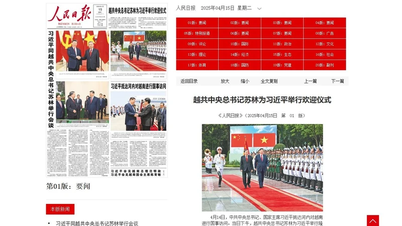Tensions escalate
Multi-year agreements with news outlets are set to expire, and Facebook's parent company Meta has reportedly said it will not renew its U.S. contracts, potentially costing some publications tens of millions of dollars in lost revenue.
Under pressure from the government, Meta has threatened to cut off all news, further straining its already fraught relationship with major news outlets. Meanwhile, Amazon, Apple, Microsoft and TikTok are stepping up their advertising with the press, and it is unclear whether the relationship with these companies will be any simpler than the relationship with the two monopolies Google and Facebook.
In late May, the California Journalism Preservation Act was proposed that would require “online platforms” to pay “journalism usage fees” to news providers whose articles appear on their services, in an effort to counter the decline in local news.

The debate between tech platforms and journalism has been a hot topic in recent years. The debate revolves around whether tech platforms, such as Facebook, Twitter, Google, and YouTube, are responsible for the content posted on their platforms.
In a statement, Meta spokesman Andy Stone called the payment structure a “slush fund” and said the bill primarily benefits “large media companies, under the guise of supporting journalism in California.”
This is Meta's first statement on the bill in California, though the company has waged similar battles over payments to news organizations at the federal level and in other countries outside the United States.
Stone said earlier in December 2022 that Meta would remove news from its platform entirely if Congress passed a bill similar to California's proposed law, called the Journalism Competition and Preservation Act, which would make it easier for news organizations to negotiate with platforms like Google and Facebook.
Meta is also threatening to pull news from its Canadian platforms in response to the country’s proposed news law. The move comes as Canada prepares to pass the Online News Act, a bill that would force big tech companies to negotiate deals with Canadian publishers and broadcasters either privately or through collective bargaining.
Tensions between Meta and the Canadian government flared after the company's president of global affairs Nick Clegg threatened in May to completely block regional news if the law, expected later this month, passed.
“The randomized trials will help us build an effective product solution to end news sharing in Canada,” Meta said, adding that the trials will run for several weeks, starting in the coming days.
Google even experimented with removing links to news articles from search results in Canada, in protest of the bill.
The bills are similar to a groundbreaking law Australia passed in 2021 that prompted Facebook and Google to threaten to cut off their services. But both giants ultimately agreed to share profits with the press. Australian officials announced in December 2022 that the deal had largely worked.
What should the press do?
According to the latest statistics, news accounts for less than 3% of what users see on their newsfeed. The press is trying to maintain readership on Fanpages is an effort that is not effective.
According to media expert Le Quoc Vinh - Chairman of Le Bros Company, the competition between newspapers and media platforms is essentially a matter of interest. If Facebook has interests related to the content of newspapers, they will have to post and use press news on their platform. But this is not a simple story, because currently Facebook and social networking platforms do not depend on the revenue of newspapers, they are willing to not post and block those news sources if necessary - this is the biggest challenge for the press today.

Competition between newspapers and media platforms is essentially a matter of interest.
So what should the press do? Mr. Le Quoc Vinh believes that the press must focus on increasing its value and must prove that it has benefits.
"The press has many media platforms, the main platform is electronic newspapers, and social networking platforms are supplements and create added values for the press. If it is simply sharing content that is already on the official newspaper page, it cannot compete with other personal pages. The number of visits to the press will gradually decrease. If the press uses social networks as an extended content or creates a forum for exchange, the press channel will be much more valuable," said Mr. Vinh.
According to expert Le Quoc Vinh, the way newspapers compete with social networks is not about speed but about authenticity and depth. The importance of newspapers cannot be denied and cannot even be replaced. Any newspaper that proves its value to the public will certainly be shared by Facebook. If you keep paying without creating value, this debate will last forever. Newspapers must choose a prominent focus to increase value, we can mention The New York Times - a newspaper that is waving its flag with the goal of "going to the truth".
Mr. Vinh added that the presence of newspapers on social media platforms does not create direct advertising value, the main purpose of that presence is to attract users to the newspaper's page (traffic). Meanwhile, the future main source of revenue for newspapers is not advertising but content sold to readers - that is still the story about the value of newspapers.
According to Mr. Le Quoc Minh - Editor-in-Chief of Nhan Dan Newspaper, Chairman of the Vietnam Journalists Association, many press agencies in the world, instead of relying too much on Facebook or Google, they join hands with each other. For example, in Switzerland there is an alliance called Onelogo - in which many press agencies join forces and have 2 million users.
Why join forces? Because social media platforms have a huge user base to sell advertising. And for newspapers, joining forces will achieve competitive numbers - building their own advertising networks. This effort has already taken place in Canada and France.
Mr Minh said that with the domestic market already crowded, many news organisations would look to expand overseas. Reach, the UK’s largest newspaper group, is preparing to open US websites for the Mirror and Express, hiring around 100 new local staff. It will also launch an Irish Star site aimed at Irish Americans. The move follows the success of the US Sun, owned by New UK, which doubled its US traffic in the past year, and the Daily Mail, which has large offices in New York and Los Angeles. It is part of a global push by other news organisations, such as Le Monde (France), which is also looking to attract English-language readers in a bid to double its subscriber base by 2025.
Phan Hoa Giang
Source



![[Photo] Magical moment of double five-colored clouds on Ba Den mountain on the day of the Buddha's relic procession](https://vphoto.vietnam.vn/thumb/1200x675/vietnam/resource/IMAGE/2025/5/9/7a710556965c413397f9e38ac9708d2f)

![[Photo] Prime Minister Pham Minh Chinh chairs a special Government meeting on the arrangement of administrative units at all levels.](https://vphoto.vietnam.vn/thumb/1200x675/vietnam/resource/IMAGE/2025/5/9/6a22e6a997424870abfb39817bb9bb6c)































































































Comment (0)